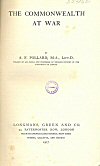
POLLARD : The Commonwealth at war (előszó)
HALF of the following essays have been published as leading articles in "The Times" Literary Supplement, and of the remainder most have appeared in the "Yale Review," the "Contemporary Review," the "Westminster Gazette," and "History " ; and I am indebted to the proprietors of these various periodicals for permission to reprint these papers. Their republication may serve to illustrate, among other things, that deceitfulness of human wishes and fallibility of human judgment which a great crisis inevitably enhances. But the history of erroneous opinion is an integral part of history; and the future historian of the great war will make little of its history if he confines his attention to actions, and ignores the public and private opinion which impeded or inspired them. Conventional history limits itself too much to what men and nations have done, and takes too little account of what they hoped to do and thought they were doing. For deeds and thoughts react upon one another and together make up the human factor in human affairs.
It is in the hope of assisting the study of history that these essays are reproduced in a more permanent and accessible form than those in which they first appeared; and the value of contemporary history is by no means confined to the age with which it deals. It is the essence of the historian's faith that past and present help to explain one another; and the light of history in the making around us illumines the making of history in the past. That is largely because we feel the present more than we can ever feel the past, and insight into human affairs is as much a matter of sense as it is of science. Moreover, it is the process of production rather than the finished product which interests the real historian, and history is a living subject because mankind is always producing and never knowing—apart from the mechanical sciences —what the finished product will be. Historical students will understand the Napoleonic wars all the better for having felt a similar tension, and communion with the past, although a very imperfect communion of saints, is essential to the continuous life of humanity.
The date of each of these essays is precisely indicated so that it may be borne in mind in the criticisms they may suggest. There is inevitably some repetition, and most of them contain expressions which they would not have contained, had they been written earlier or later; but to modify the record of expressed opinion in the light of later events indicates a dishonest ambition for consistency or prescience, and is one of the most insidious forms of historical forgery.
A. F. POLLARD.